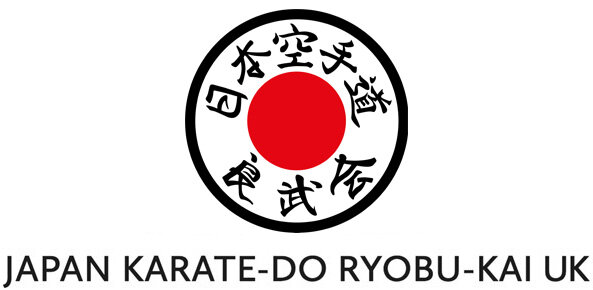Japan Karate Ryobu-Kai United Kingdom
History, Structure & Founder Members Committee
JKR-UK History
The Japan Karate-Do Ryobukai first appeared with a visit from Kaicho Yamazaki under the invitation of Terry O’Neill Sensei who organised a number of seminars in the North West of the Country in the mid 1970’s. Kaicho taught both Karate and Kobujutsu for a whole weekend.
Yamazaki Kaicho teaching at Dennis Tilley Sensei’s dojo in Manchester
The first Ryobukai dojo was set-up in the late 70’s by two seniors’ from JKR Venezuela who were studying at Oxford University. It was during this time that Yamazaki Kaicho was able to demonstrate his skills and Shindo Jinen Ryu to the crown prince of Japan who was at the time studying at Oxford. Once the Venezuelans returned home this dojo sadly did not survive due to governing body politics around at the time favouring university dojos representing heavily competing sport-based styles.
The JKR was then represented in the UK by a number of different individuals whose agenda’s and action actually lead to their expulsion from the Japan Karate-Do Ryobukai International.
It was also fundamentally clear that the full syllabus of Shindo Jinen Ryu was not being adhered to.
This left a number of very loyal founder members who wished to stay with the JKRI to pick up the pieces. In 2003 the JKRUK was formed following the remaining members organising and personally funding the Konishi Cup event in Brighton.
Our current Head Instructor and National Country Representative Simon Oliver Sensei 7th Dan JKR joined the group officially. Oliver Sensei had first trained with Konishi Soke in the 1970’s when he first visited Japan. Although he was then part of the JKA it had left a profound impression that was to remain with him forever.
The JKRUK remains a small group of dojos with volunteer instructors working to promote the Shindo Jinen Ryu and Konishi Soke’s teachings.
JKRUK has its own in country policies but works closely with the JKRI to help support international activity.
The JKRUK teaches and promotes the full Shindo Jinen Ryu syllabus of Konishi Soke.
This includes the following as part of our regular classes.
KORYU-TE (Old style hand) principles
KARATE-JUTSU (Empty Hand)
AIKI-JUTSU (Restraining)
JUJUTSU (Grappling)
KOBUJUTSU (Old Style Weapons)
- BO (5ft to 6ft Staff)
- JO (4ft Staff)
- TONFA (Millstone handles)
- KAMA (Sickle)
- SAI (Trident)
- NUNCHAKU (Horse Bridle/ Rice Flail)
- TANBO (2ft to 3ft Staff)
- SHURIJIN (Weighted Chain)
- TIMBE & ROCHIN (Shield and short spear)
- TEKKO (STIRUP)
KENJUTSU (Sword)
IAIJUTSU (Drawing of the Sword)
Not all our Dojo’s offer the full range of weapons tuition due to the skill level and knowledge of individual Instructors.
FMC (Founder Member’s Committee)
JKRUK Structure
There are three Founder Member Dojo’s who are responsible for the FMC (Founder Member Committee) who provide the administration of the JKRUK and the seniors of the FMC have personally funded the activities of our group since its inception in 2003.
SATELLITE Dojo
The JKRUK does not formally today operate a direct branch dojo structure due to most dojos are ever transitioning from another style or they are dojos that are satellites to another dojo. Today only the Zanshin JKRUK Hombu has satellites dojos.
JKRUK Branch Dojo
Today there are three direct branch dojos and their Dojo-Chos make up the FMC.
• The Zanshin JKRUK Hombu Dojo Nottingham
• Crawley JKRUK Dojo
• Brighton JKRUK Dojo
JKRUK Satellite Dojo
Today there are ten satellite dojos.
• Cambridge JKRUK Dojo
• Fudoshin JKRUK Dojo Telford
• Motobu JKRUK Dojo Codicote
• Kashiwa JKRUK Dojo High Wycombe
• Konishi JKRUK Dojo Welwyn
• Senshi-no-Michi Dojo JKRUK South Suffolk
• St. Ives JKRUK Dojo
• Tora-Do JKRUK Dojo Mansfield
• Yamakai JKRUK Dojo Flitton
• Yamazaki JKRUK Dojo Wootton
To maintain a JKRUK branch or satellite dojo there are certain conditions;
• You purchase a JKRUK Branch Certificate and display it.
• This certificate renewable every 12 months.
• All members must register with the JKRUK and obtain a JKRUK (JKR recognised licence).
• The Dojo Cho (Head) does not have to be the main Sensei.
• The main Sensei must hold the minimum JKR rank of Sandan to run a branch dojo and (Only the NCR and JKRUK Head Instructor can allow the exception of this rule and then with the acknowledgment of the FMC). A satellite dojo must have the main Sensei with a recognised Sandan rank, and they must be training towards a JKR recognised grade.
The branch or satellite must have the following in place;
• Suitable DBS checks in place.
• Instructor Insurance.
• Display the latest JKRUK Member to Member Insurance.
• The Dojo Cho must have signed the JKRUK Code of Conduct which has been signed by both the Dojo-Cho and the National Country Representative displayed in the dojo.
• Adequate First Aid Support.
• The dojo should be suitable for the teaching of Shindo Jinen Ryu.



